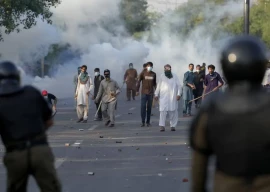
With the additional burden of over half-a-million refugees displaced by the ongoing military operation in North Waziristan Agency (NWA), the United Nations High Commissioner for Refugees (UNHCR) in Pakistan foresees the assistance for displaced population to stretch till next spring.
Speaking to The Express Tribune, UNHCR Country Representative and Acting Humanitarian Coordinator Neill Wright said that while the contingency plan drafted by the UN holistically took into account the details of the operation, the actual number of displaced persons proved higher than estimated earlier.
Wright said that the majority of the population fleeing out of NWA was opting to stay with host communities in Bannu, adding that the influx of IDPs has doubled the population of Bannu District. Meanwhile, a small fraction of displaced persons have moved to DI Khan, Tank and further south towards Karachi.
Wright said the camp established at Bakakhel remained underutilised for reasons such as security, capacity and the facilities being provided to the displaced persons.
“The Tehrik-i-Taliban Pakistan (TTP) has publicly threatened retaliation,” he said. Other issues such as cultural concerns and pressure from tribal leaders have also resulted in fewer people residing in the camps.
Wright said that there was a dire need to identify areas to establish new camps. He said that the design of camps would have to be revised for the winter.
“It is likely that we will be managing the IDPs through winter. The overall assistance is expected to stretch until spring 2015.” said Wright. “These people cannot be under plastic sheets when winter comes” he said.
Wright said that those residing in schools were facing water shortages and lack of latrine facilities.
“We cannot disconnect these issues. As of today, we are in an emergency situation where, along with security, all other issues need to be tackled simultaneously for an effective response,” said Wright. He added the government was keen and willing to make support available, however, specialist skills for each cluster was required.
About the resources available with the refugee agency, Wright said that funds available were adequate to meet the needs of already existing 160,000 displaced families for a year. However, with the new displacement, the response was immediately shifted towards meeting the needs of the newly displaced.
Wright said that while donors in Islamabad had contributed or committed to contribute financial assistance worth $23 million, an assessment reveals that approximately $99 million would be required to meet the emerging needs of the IDPs.
He said that an international appeal should be launched for the donors to meet the shortfall. Wright said magnetising funds for Pakistan, especially at a time when there were ongoing humanitarian crises in other parts of the world such as in Syria and South Sudan, would be challenging.
Among other challenges Wright said, an effective coordination structure must be established for the existing 160,000 families and half-a-million newly displaced persons. “In the case of NWA, the structure of response has changed where the Ministry of States and Frontier Regions (Safron) and the military are directly involved,” he said.
“We need to reduce bureaucratic delays such as requirements for no-objection certificates for humanitarian aid organisations,” Wright said. Safe access for humanitarian actors should be a top concern. “It is a new environment that we have to work in, which is closer to [risky areas],” he said.
The pattern in the past five years reveals that five to 10 per cent choose to live in camps.
UNHCR’s priority in Pakistan is to achieve lasting solutions for one of the largest and most protracted refugee situations in the world, he said.
Pakistan continues to host approximately 1.7 million refugees. Most are from Afghanistan and are scattered across refugee villages and urban areas. Since March 2002, the UNHCR has facilitated the return of approximately 3.7 million registered Afghan refugees from Pakistan.
Published in The Express Tribune, July 18th, 2014.












































COMMENTS
Comments are moderated and generally will be posted if they are on-topic and not abusive.
For more information, please see our Comments FAQ